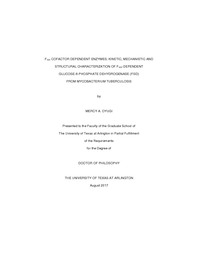
ATTENTION: The works hosted here are being migrated to a new repository that will consolidate resources, improve discoverability, and better show UTA's research impact on the global community. We will update authors as the migration progresses. Please see MavMatrix for more information.
Show simple item record
| dc.contributor.advisor | Johnson-Winters, Kayunta | |
| dc.creator | Oyugi, Mercy A | |
| dc.date.accessioned | 2018-03-08T18:38:18Z | |
| dc.date.available | 2018-03-08T18:38:18Z | |
| dc.date.created | 2017-08 | |
| dc.date.issued | 2017-08-02 | |
| dc.date.submitted | August 2017 | |
| dc.identifier.uri | http://hdl.handle.net/10106/27263 | |
| dc.description.abstract | F₄₂₀-dependent glucose-6-phosphate dehydrogenase (FGD) from Mycobacterium tuberculosis (Mtb) is one of a few enzymes that utilize the unique F₄₂₀ cofactor for catalysis. FGD catalyzes the first committed step of the pentose-phosphate pathway, where it uses the oxidized F₄₂₀ cofactor to convert glucose-6-phosphate (G6P) to 6-phosphogluconolactone. Mtb is the bacteria that causes Tuberculosis (TB), which is currently the world’s deadliest bacterial disease. The pentose-phosphate pathway is important for survival of Mtb, since it provides precursors for nucleic acid synthesis and yields reducing equivalents that are essential for other metabolic pathways. The fact that FGD catalyzes the committed step of the pentose-phosphate pathway makes it a promising target for therapeutic purposes against TB. Chapter 1 gives detailed background on the F₄₂₀ cofactor, FGD, and the direct link to TB disease.The focus of the work presented here is to investigate FGD using a variety of protein characterization methods so as to deduce structural and mechanistic information about the enzyme. Chapter 2 discusses the mechanistic investigation of the FGD reaction using site-directed mutagenesis of essential active site residues. Five FGD variants (H40A, E109Q, W44A, W44F, and W44Y) along with the wild-type FGD were analyzed using fluorescence binding assays, steady state and pre-steady state kinetic methods. All five variants were found to be less catalytically active than the wild-type FGD, with the FGD H40A variant being the least active with ~1000 fold decrease in activity. The pH profile of the wild-type FGD, FGD H40A and FGD E109Q confirmed that Glu109 is the active site acid for the FGD reaction, while His40 was proven to not be the active site base as was previously proposed. The multiple turnover pre-steady state kinetics exponential decay curves were biphasic, suggesting that hydride transfer is not rate-limiting. Chapter 3 presents further investigation of the wild-type FGD mechanism using substrate inhibition experiments along with solvent and substrate deuterium isotope effects studies. The substrate inhibition studies revealed an ordered substrate addition mechanism in which FGD must first bind F420 before binding the G6P substrate. The deuterium isotope effects results yielded normal SKIE on the kcat and kcat/Km, and this effect is likely a contribution of the Glu109 hydrogen that protonates the F₄₂₀ at position N1. In Chapter 4, the catalytically inactive FGD H40A variant was successfully co-crystallized with both F₄₂₀ and G6P in an attempt at providing novel insights into the interactions within the FGD active site. The crystal structure of this variant was solved at 2.9 Å resolution, revealing a vast network of interactions between the phosphate moiety and C1-C4 hydroxyl groups of G6P with some FGD active site residues. | |
| dc.format.mimetype | application/pdf | |
| dc.language.iso | en_US | |
| dc.subject | F420-dependent glucose-6-phosphate dehydrogenase (FGD) | |
| dc.subject | F420 cofactor | |
| dc.subject | Tuberculosis disease (TB) | |
| dc.subject | Site-directed mutagenesis | |
| dc.subject | Protein expression | |
| dc.subject | Enzyme kinetics | |
| dc.subject | Kinetic isotope effects | |
| dc.subject | Enzyme mechanism | |
| dc.subject | Protein crystallography | |
| dc.subject | Protein purification | |
| dc.title | F₄₂₀ cofactor dependent enzymes : kinetic, mechanistic and structural characterization of F₄₂₀-dependent glucose-6-phosphate dehydrogenase (FGD) from Mycobacterium tuberculosis | |
| dc.type | Thesis | |
| dc.degree.department | Chemistry and Biochemistry | |
| dc.degree.name | Doctor of Philosophy in Chemistry | |
| dc.date.updated | 2018-03-08T18:38:18Z | |
| thesis.degree.department | Chemistry and Biochemistry | |
| thesis.degree.grantor | The University of Texas at Arlington | |
| thesis.degree.level | Doctoral | |
| thesis.degree.name | Doctor of Philosophy in Chemistry | |
| dc.type.material | text | |
| dc.creator.orcid | 0000-0002-2600-745X | |
Files in this item
- Name:
- OYUGI-DISSERTATION-2017.pdf
- Size:
- 2.533Mb
- Format:
- PDF
This item appears in the following Collection(s)
Show simple item record


